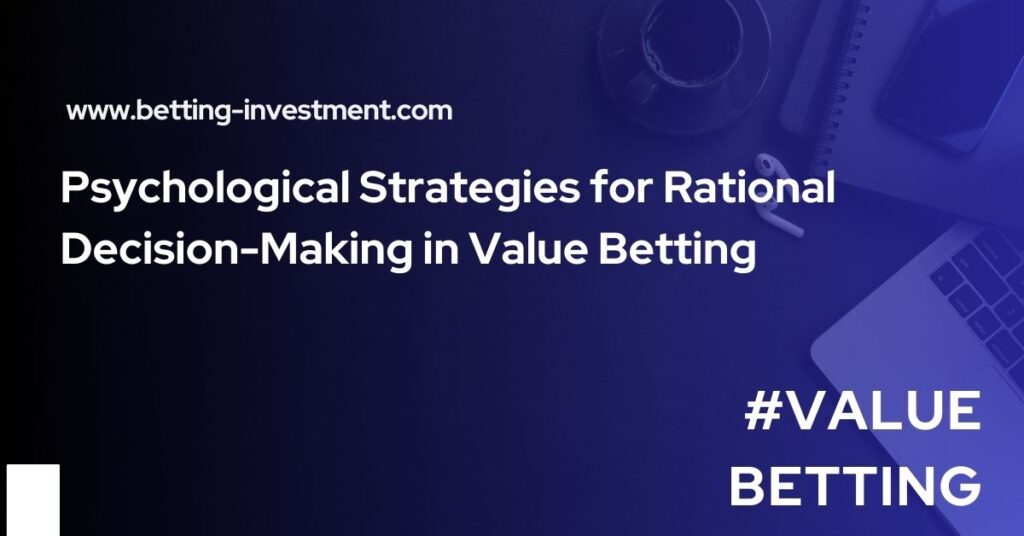In the world of sports betting, value betting stands out as a strategy that promises long-term profitability. Unlike traditional betting, where emotions often dictate choices, value betting requires a rational approach to identify bets that offer a higher probability of success than the odds suggest. This article delves into the psychological strategies that can enhance rational decision-making in value betting, ensuring that bettors make informed and profitable choices.

Understanding Value Betting
Before exploring the psychological strategies, it’s essential to understand what value betting entails. At its core, value betting is about finding discrepancies between the bookmaker’s odds and the actual probability of an event occurring. When you identify a bet where the probability of winning is higher than the odds imply, you have found a value bet. This approach requires a keen analytical mindset and the ability to remain objective, even in the face of potential losses.
The Role of Probability
- Probability Assessment: Successful value betting hinges on accurately assessing the probability of an event. This involves understanding the sport, the teams or players involved, and external factors that might influence the outcome.
- Odds Comparison: Regularly comparing odds across different bookmakers can help identify value bets. Look for odds that differ significantly from the market average, as these may indicate a potential value opportunity.
Psychological Barriers to Rational Decision-Making
Despite the logical foundation of value betting, several psychological barriers can impede rational decision-making. Recognizing and overcoming these barriers is crucial for success.
Emotional Bias
- Fear of Loss: The fear of losing money can lead to irrational decisions, such as chasing losses or avoiding bets altogether. It’s important to accept that losses are part of the process and focus on long-term profitability.
- Overconfidence: Believing too strongly in one’s ability to predict outcomes can result in overestimating probabilities and making poor betting choices.
Cognitive Bias
- Confirmation Bias: This occurs when bettors seek information that confirms their pre-existing beliefs while ignoring contradictory evidence. To counter this, actively seek out diverse perspectives and data points.
- Recency Bias: Placing too much emphasis on recent events can skew probability assessments. It’s essential to consider a broader range of data to make informed decisions.
Strategies for Rational Decision-Making
To overcome these psychological barriers, bettors can employ several strategies to enhance rational decision-making in value betting.
Developing a Betting Plan
- Set Clear Objectives: Define what you hope to achieve with value betting, whether it’s a specific profit target or a long-term growth strategy.
- Establish a Budget: Determine how much money you are willing to risk and stick to this budget. This helps manage emotions and reduces the temptation to chase losses.
- Create a Consistent Routine: Regularly analyze odds, assess probabilities, and review past bets to refine your strategy.
Enhancing Analytical Skills
- Data Analysis: Use statistical tools and software to analyze past performance and identify patterns. This can help in making more accurate probability assessments.
- Continuous Learning: Stay informed about the sports you bet on, including player injuries, team dynamics, and other relevant factors. This knowledge can improve your ability to identify value bets.
Practicing Mindfulness and Emotional Control
- Mindfulness Techniques: Practice mindfulness to stay present and focused, reducing the impact of emotions on decision-making. Techniques such as meditation and deep breathing can help maintain a calm mindset.
- Emotional Detachment: View each bet as a business decision rather than a personal one. This detachment can help in making objective choices based on data rather than emotions.
Tools and Resources for Better Decision-Making
Leveraging tools and resources can further enhance rational decision-making in value betting.
Betting Software and Apps
- Odds Comparison Tools: Use these tools to quickly compare odds across multiple bookmakers, helping identify potential value bets.
- Betting Calculators: These can assist in calculating the expected value of a bet, ensuring that you only place bets with positive expected outcomes.
Community and Expert Insights
- Online Forums and Communities: Engaging with other bettors can provide valuable insights and different perspectives on potential bets.
- Expert Analysis: Follow experts in the field who provide data-driven analysis and predictions. This can complement your own assessments and improve decision-making.
Reflecting on Your Betting Journey
As you implement these psychological strategies, it’s important to regularly reflect on your betting journey. This reflection can provide insights into your decision-making process and highlight areas for improvement.
- Review Past Bets: Analyze both successful and unsuccessful bets to understand what worked and what didn’t. This can help refine your strategy and improve future decision-making.
- Set Milestones: Establish short-term and long-term milestones to track your progress. Celebrating small victories can boost motivation and reinforce positive habits.
In conclusion, value betting offers a rational approach to sports betting that can lead to long-term profitability. By understanding the psychological barriers to rational decision-making and employing strategies to overcome them, bettors can enhance their ability to identify value bets. With a clear betting plan, enhanced analytical skills, and the right tools and resources, you can make informed decisions that maximize your chances of success. Remember, the journey is just as important as the destination, so take the time to reflect and learn from each step along the way.


